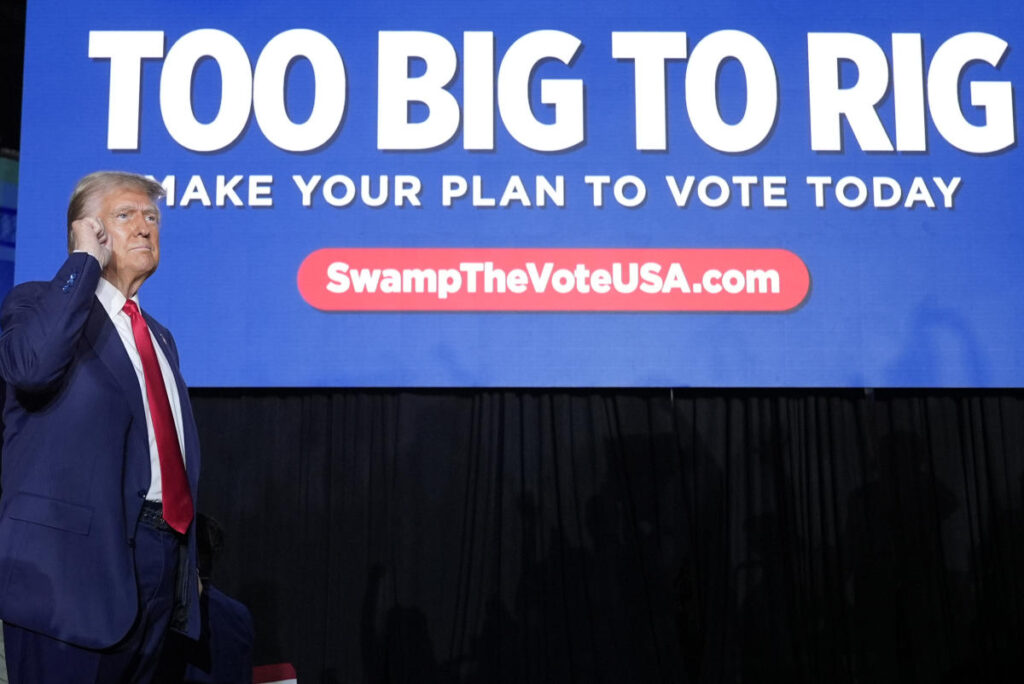Donald Trump is strategically laying the groundwork to challenge the potential outcome of the 2024 presidential election, echoing his actions from the previous election in 2020. He consistently communicates to his supporters that only a “huge” victory can prevent cheating, asserting that he can only lose if Democrats engage in fraudulent practices. Trump has notably refrained from committing to accept the election results, continuously alleging that electoral cheating is already occurring. This rhetoric, which echoes the incendiary claims made by Trump in the past, is alarming to many Democrats who fear a repeat of the events surrounding the January 6 Capitol riot, which was fueled by Trump’s attempts to negate the 2020 election results.
His campaign has now incorporated a sophisticated “election integrity” initiative, supported by the Republican National Committee, which has already initiated over 130 lawsuits and mobilized over 230,000 volunteers to act as poll watchers and workers nationwide. Trump’s narrative regarding voter fraud is the linchpin of his 2024 campaign, which seeks to instill an atmosphere of suspicion against the electoral process. He specifically targets various groups, claiming they are conspiring to manipulate the electoral voting process. For instance, Trump has baselessly claimed that illegal migrants are being registered to vote, suggesting an unfounded conspiracy that Democrats aim to use these individuals to sway the election in their favor.
Moreover, Trump has criticized efforts by Democrats to reach American voters living abroad, implying they intend to “cheat” by diluting military votes in favor of overseas ballots. He has simultaneously engaged with overseas voter populations himself, illustrating hypocrisy in his assertions. In recent rallies, Trump also speculated on Vice President Kamala Harris’s knowledge of the election outcome, insinuating that her public appearances act as indicators of secretive knowledge that could grant the Democrats an unfair advantage, a claim without any factual backing. This narrative plays into his broader strategy of instilling doubt in voters’ minds about electoral integrity.
Trump has specifically scrutinized potential voter fraud in Pennsylvania, alleging that thousands of fraudulent voter registrations have surfaced. He referenced specific counties, claiming that election workers discovered suspicious patterns and lengthy false ballots. Yet, investigation reports indicate that local officials are merely reviewing suspicious registration applications, and there hasn’t been a substantiated identification of “fake votes.” This situation has been framed wrongly by Trump to promote a narrative of immediate and widespread election misconduct, even as officials verify that the system is functioning as it should.
In conjunction with his dubious claims, Trump has not shied away from threatening severe actions against individuals he suspects of participating in electoral fraud. He has vowed that once he wins the election, he will pursue legal repercussions, including severe penalties for anyone he deems to have engaged in cheating, despite the widespread consensus, including that of his former attorney general, that no systemic fraud occurred during the 2020 elections. This posturing raises significant concerns, particularly given Trump’s past behavior, where he sought investigations against political opponents, suggesting that he would not hesitate to enforce retribution against actual or perceived adversaries.
The continuity of Trump’s rhetoric and tactics reflects a broader strategy to sow distrust in the electoral process and galvanize his supporter base through the idea that a rigged system is against them. Despite the assertions lacking any credible evidence, Trump’s approaches resonate with a significant portion of the electorate, and he is eager to inspire actions within his ranks, setting the stage for potential upheaval should the outcome not align with his expectations. As he navigates this treacherous political landscape, the implications of Trump’s claims extend beyond individual allegations; they threaten to further polarize the already fragmented political climate and undermine confidence in democracy as a whole.

